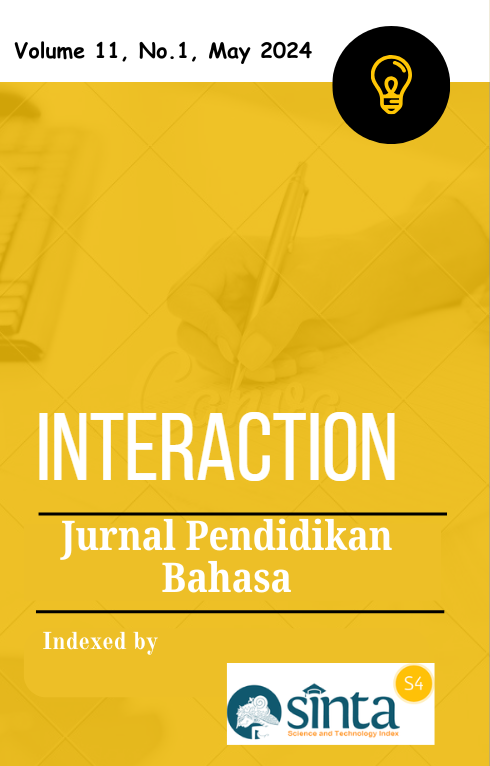ICT Integration in the English Learning Context for the Higher Education Students: Potencies and Issues
Abstract
Information and communication technology (ICT) exists as a new trend in English language teaching and learning for recent years. This study aimed to explore the potencies and issues to the use of ICT in English language learning process. A descriptive qualitative research method was used to find out the phenomena of the use of ICT in an English language course for one semester. Sixty-three higher education students at a Health Polytechnic in Jayapura were the sample of this research. The data of this research were collected from questionnaire and Interview. The findings indicated that students have adequate knowledge about ICT tools and the use in English language learning activities. ICT has high potencies to be applied and developed due to its roles, benefits and students ‘attitudes toward the implementation of ICT in English class. Students gain the positive impact of using ICT both in offline and online English Class. The implementation of ICT in English teaching and learning process can improve English competency, promote the learning motivation, and provide variety in learning process, and flexibility in time and place. On the other hand, some factors such as the lack of ICT literacy, incompatibility of ICT Tools, cost, and error of internet connection become the challenges that diminish the efficacy of ICT deployment in the English learning process.
Downloads
References
Anderson, L, W. (1985). Attitude and Their Measurement. The International Encyclopedia of Education, 1, 352-358.
Apriani, E. (2017). Utilizing Pre-service English Teacher’s Classroom and Management Strategies at Junior High School in Rejang Lebong Regency. ENGLISH FRANCA: Academic Journal of English Language and Education, 1(2), 149-194. http://dx.doi.org/10.29240/ef.v1i2.291
Apriani,E.,& Hidayah, J. (2019). The ICT Used by the English Lecturers for Non English Study Program Students at IAIN Curup. Vision: Journal for Langauge and Foreign Language Learning. http://repositori.iaincurup.ac.id/id/eprint/121.
Asabere, N.Y. & Enguah, S.E. (2012). Integration of Expert System in Mobile Learning. Journal of Information and Communication Technology Reseach, 2(1), 55-61
Bingimlas, K. (2009). Barriers to the Successful Integration of ICT in Teaching and Learning Environment: A Review of the Literature. Eurasia Journal of Mathematics, Science and Technology Education, 5(3), 235-245. https://doi.org/10.12973/ejmste/75275.
Boutonglang, D., & Flores, F. (2011). A study on integrating technology to engage 7th graders into an English as a foreign language (EFL) classroom in a rural secondary schools, Thailand. International Journal of Arts & Sciences, 4 (18), 195-206
Hadijah., S & Shalawati. (2017). Investigating Teachers’ Barriers to ICT Integration in Teaching English at Senior High Schools in Pekanbaru. Proceeding of ISELT-5, 302-310.
Idowu, S.O., & Gbadebe, A, D. (2017). Extend the Utilization of Information and Communication Technology Tools by English Language Teachers in Ijebu- Ode and Odogbolu Local Government Areas of Ogun State, Nigeria. International Journal of Arts and Science, 9(4), 589-696.
Melor. (2007). Malaysian ESL Teachers’ Use of ICT in Their Classroom: Expectations and Realities. RECALL: The Journal of EUROCALL, 9(1), 79-95.
Melor., Lubis., Pei Lin. (2019). Language Learning via ICT: Uses, Challenges, and Issues. WSEAS Transaction on Information Science and Aplication, 9(6), 1453 – 1467. http://www.wseas.us/e-library/transactions/information/2009/29-575.pdf
Murray, D, E. (2005). Technologies for Second Language Literacy. Annual Review of Applied Linguitics, 25(1), 188-201.
Al- Senaidi, S., Lin, L.,& Pairot, J. (2009). Barriers to Adopting Technology in Teaching and Learning in Oman. Computer and education, 53, 575-590. http://dx.doi:10.1016/j.compedu.2009.03.015
Rachamalla. (2022). Usage of ICT in English Language Teaching. International Journal of Innovative Research in Science and Engineering, 7(11), 22-25.
Selwyn, N. (2003). ICT in Non-Formal Youth and Adult Education: Defining Territory. OECD/ NCAL International Roundtable, Philadelphia.
Utami, Ayu et.all. (2021). Empowering ICT Potentials in English Language Teaching. POLINGUA: Scientific Journal of Linguistics, Literature, and Language Education, 10(2), 42-48. DOI:10.30630/polingua.v10i2.180.
Wang, H., & Chen, C.W. (2019) . Learning English From Youtubers: English L2 Learners Self-Regulated Language Learning on Youtube. Inoovation in Language Learning and Teaching, 14(4), 333-346. https://doi.org/10.1080/17501229.2019.1607356.
Wijayanti.,Nugroho., Mursyid., & Rahmawansyah. (2023). Teaching EFL Students in Post-Pandemic Era: ICT Tools and Obstacles. Al- Ishlah: Jurnal Pendidikan, 15(2), 2591 – 2604. https://doi.org/10.35445/alishlah.v15i2.2943.




.png)



22.png)
